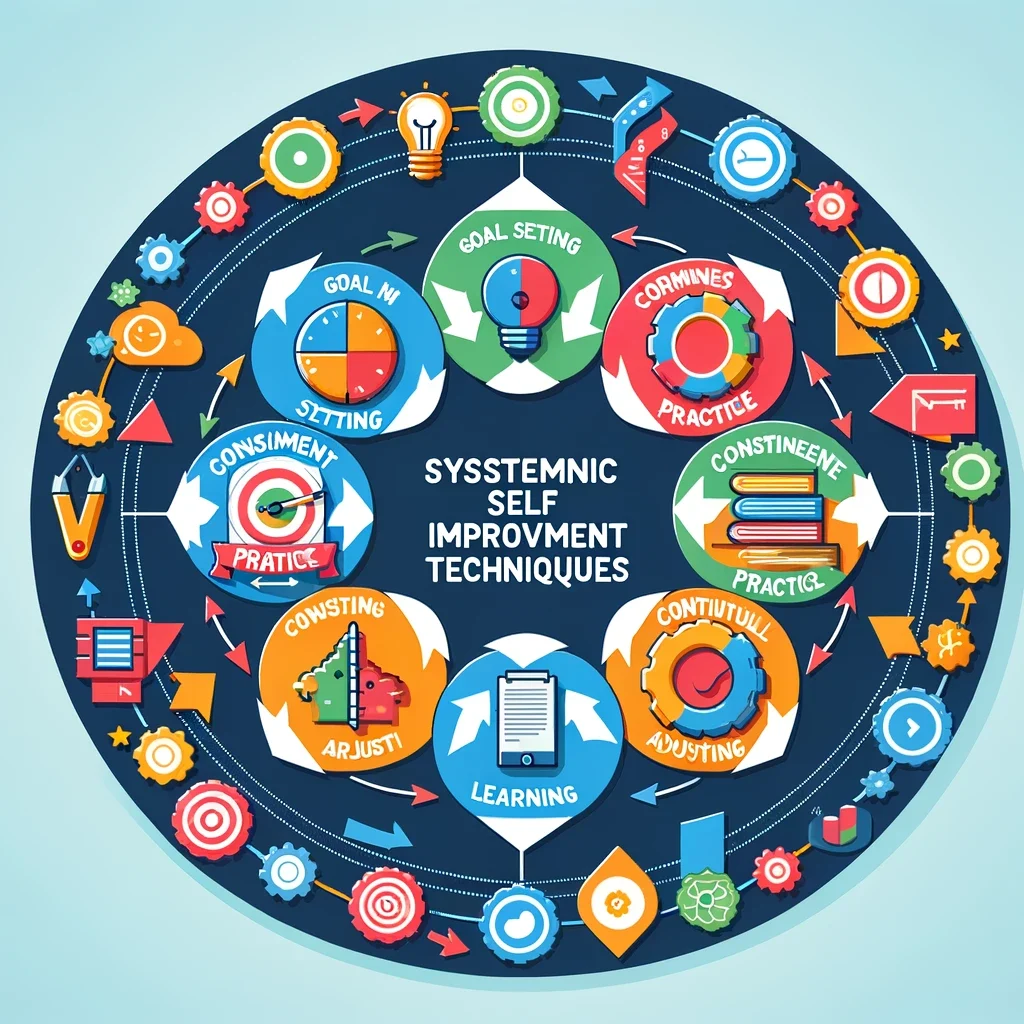Introduction

Ever wondered how some people seem to continually grow and improve, achieving their goals with apparent ease? The secret often lies in systematic self improvement techniques. These methods provide a structured approach to personal growth, helping you achieve your full potential. In this article, we’ll explore what these techniques are, their benefits, and how you can implement them in your life.
What Are Systematic Self Improvement Techniques?

Definition and Explanation
Systematic self improvement techniques are structured methods designed to help individuals enhance their skills, habits, and overall personal development. These techniques involve setting clear goals, practicing consistently, and continuously learning and adjusting.
Definition and Explanation of Systematic Self Improvement Techniques
Benefits of Using Systematic Approaches
Using a systematic approach to self improvement offers numerous benefits. It provides a clear roadmap, increases motivation, and helps track progress. By following a structured plan, you can achieve your goals more efficiently and effectively.
Key Principles of Systematic Self Improvement

Goal Setting
The foundation of any self improvement plan is goal setting. By setting Specific, Measurable, Achievable, Relevant, and Time-bound (SMART) goals, you create a clear path to follow. This approach ensures your goals are realistic and attainable.
Consistent Practice
Consistency is key to improvement. Whether it’s learning a new skill, improving your fitness, or developing better habits, regular practice is essential. Consistency helps reinforce new behaviors and makes them a part of your routine.
Continuous Learning
Continuous learning is crucial for personal growth. This involves seeking new knowledge, learning from experiences, and staying open to feedback. By continuously learning, you can adapt to changes and keep progressing.
Popular Systematic Self Improvement Techniques

Time Management Techniques
Effective time management is a fundamental self improvement technique. Methods such as the Pomodoro Technique, Eisenhower Box, and time blocking help you manage your time more efficiently, increasing productivity and reducing stress.
Mindfulness and Meditation Practices
Mindfulness and meditation are powerful tools for self improvement. These practices help reduce stress, improve focus, and enhance emotional well-being. Regular meditation can lead to better mental clarity and emotional stability.
Physical Health and Fitness Routines
Physical health is a crucial aspect of self improvement. Regular exercise, a balanced diet, and adequate sleep are essential for maintaining good health. Techniques such as setting fitness goals, tracking progress, and maintaining a consistent routine can help improve physical health.
Creating a Personal Improvement Plan

Assessing Current Skills and Areas for Improvement
The first step in creating a personal improvement plan is to assess your current skills and identify areas for improvement. This can involve self-assessment, feedback from others, and using tools like SWOT analysis.
Setting SMART Goals
Once you have identified areas for improvement, the next step is to set SMART goals. This ensures your goals are clear and achievable, providing a roadmap for your self improvement journey.
Developing a Step-by-Step Plan
A step-by-step plan breaks down your goals into manageable tasks. This approach helps you stay organized and focused, making it easier to track progress and make adjustments as needed.
Implementing Systematic Self Improvement Techniques

Daily Habits and Routines
Incorporating new habits into your daily routine is crucial for self improvement. Start small and gradually build up to more significant changes. Consistency in daily habits leads to long-term success.
Utilizing Tools and Resources
There are numerous tools and resources available to aid in self improvement. These include apps, books, online courses, and support groups. Utilizing these resources can provide guidance and support throughout your journey.
Tracking Progress and Making Adjustments

Regularly tracking your progress is essential for staying on track. Use journals, apps, or progress charts to monitor your achievements. Be flexible and ready to make adjustments to your plan as needed.
Overcoming Challenges in Self Improvement
Identifying Common Obstacles
Common obstacles in self improvement include lack of motivation, time constraints, and fear of failure. Recognizing these challenges is the first step in overcoming them.
Strategies for Staying Motivated
To stay motivated, set small, achievable goals and celebrate your successes. Surround yourself with supportive people and stay focused on the benefits of your efforts.
Seeking Support and Accountability
Having a support system can significantly impact your success. Seek support from friends, family, or join a community of like-minded individuals. Accountability partners can help you stay committed to your goals.
Case Studies of Successful Self Improvement
Personal Stories of Transformation
Hearing personal stories of transformation can be inspiring and motivating. For example, consider the story of someone who used systematic techniques to overcome procrastination and achieve their career goals.
Lessons Learned from Real-Life Examples
Learning from real-life examples provides valuable insights. These stories highlight the importance of persistence, adaptability, and the power of systematic techniques in achieving personal growth.
Resources for Systematic Self Improvement
Books and Articles
Books like “Atomic Habits” by James Clear and articles on self improvement provide practical advice and techniques. These resources can serve as a guide and inspiration for your journey.
Online Courses and Workshops
Online courses and workshops offer structured learning experiences. Platforms like Coursera and Udemy provide a wide range of courses on self improvement topics.
Support Groups and Communities
Joining support groups and communities can provide encouragement and accountability. Online forums and local meetups offer opportunities to connect with others on a similar journey.
Conclusion
Systematic self improvement techniques provide a structured and effective way to achieve personal growth. By setting clear goals, practicing consistently, and continuously learning, you can reach your full potential. Start your journey today and embrace the power of systematic self improvement.
FAQs
What is a systematic self improvement technique?
A systematic self improvement technique is a structured method designed to help individuals enhance their skills, habits, and overall personal development.
How do I start a systematic self improvement plan?
To start a systematic self improvement plan, assess your current skills, set SMART goals, and develop a step-by-step plan. Consistently practice and track your progress.
What are the benefits of systematic self improvement?
The benefits include increased motivation, improved skills, and a clear roadmap to achieving your goals. It helps in tracking progress and making necessary adjustments.
How do I stay motivated in my self improvement journey?
Stay motivated by setting small, achievable goals, celebrating your successes, and seeking support from friends, family, or accountability partners.
Where can I find resources for self improvement?
Resources for self improvement include books, articles, online courses, workshops, and support groups. Platforms like Coursera and Udemy offer structured courses on various topics.


